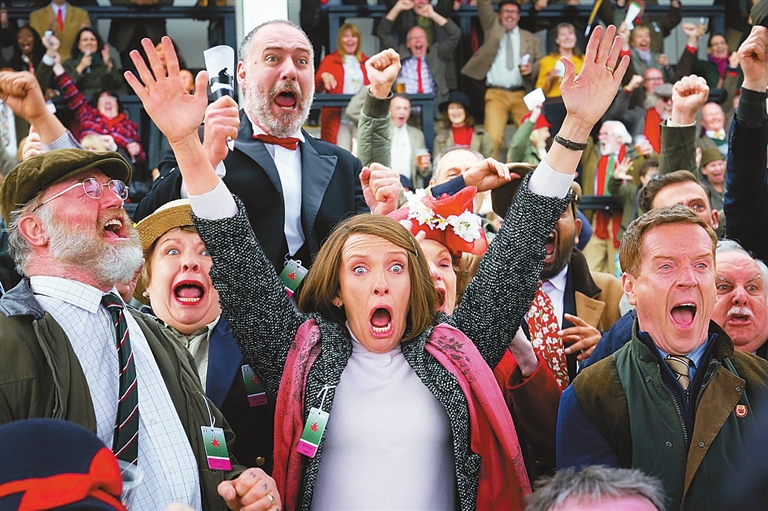
Anyone who saw director Louise Osmond’s 2015 documentary “Dark Horse,” winner of the audience award at Sundance that year, knew it was certain that this almost-too-good-to-be-true story would get made into a feature film someday. The documentary follows Brian “Daisy” Vokes and his wife Jan, who were behind the plan to breed a racehorse and pay for its keep and training through weekly subscriptions. The members of this syndicate were mostly clients at the local village pub where Jan worked as a barmaid, in a former mining village in South Wales, the United Kingdom. The feature film from director Euros Lyn stars Toni Collette as Jan and Owen Teale as Daisy in the leading roles. Neil McKay’s script focuses largely on the human characters rather than the details of racing. Jan’s typical day is divided by chores — feeding her various pets (a massive wolfhound-type dog, some geese that live in the kitchen), working a shift at the local supermarket, and tending to her elderly parents at their home nearby. Then she goes home to see her husband Daisy, a former farmhand whose arthritis has turned him into something of a couch potato. After feeding him dinner, it’s down to the pub to work the evening shift. Tonight, however, she overhears tax adviser Howard Davies (Damian Lewis) talking knowledgeably about horse racing, a passion of his, but one that almost cost him his family home when a bet didn’t come off. A natural nurturer, Jan has won prizes all her life by breeding whippets, racing pigeons and the like, and she gets the notion she’d like to try raising a racehorse next. Cue one of many pop-music-bedded montages showing Jan throwing herself into researching horses and racing, and then bringing Daisy, Howard and many others to her cause as she buys a mare, Rewbell. They stable her in the local garden allotment while they raise enough through the syndicate for stud fees to get Rewbell knocked up by a thoroughbred sire. The plan succeeds, and the offspring is a beautiful chestnut stallion whom the syndicate votes to name Dream Alliance. Sadly, Rewbell dies in childbirth. From here on out, the screenplay goes through regular cycles of challenge, setback, recovery and victory, as if replicating in the storyline the inherent structure of a typical horse race. For instance, Jan and Daisy bring Dream to Philip Hobbs (Nicholas Farrell), one of the top trainers in the country, hoping he’ll agree to get Dream into racing shape. Hobbs almost dismisses them as amateurs unworthy of his time, and Dream looks too fiery to control but then suddenly takes off, showing form that might just be promising. So Hobbs takes him on. Along the cycles, Dream starts placing higher and higher at the meets. Adroitly edited as they toggle back and forth between the track and the spectators looking variously nervous and then ecstatic, the racing scenes are expertly assembled, enhanced with sometimes surprising angles on the horses themselves, the odd drone shot, and thoughtful scoring by composer Benjamin Woodgates. Best of all, no one can do joyous happy face like Collette as her Jan watches Dream cross the finish line, even in third place — although Lewis, Teale and some of the many supporting characters come close. It’s admirable the way the film balances the exciting race sequences with the drama going on off the track, particularly between Howard and his wife, Angela (Joanna Page), who doesn’t approve of his gambling — understandably, given that he almost lost their house. Elsewhere, some members of the syndicate gang up against Jan when she refuses to sell Dream to a rival breeder (Peter Davison) without consulting them. But it all works out in the end. (SD-Agencies) | 
